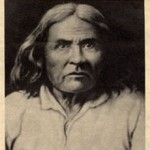
Nature doesn’t write off parts of the Earth, and neither can we.
by Sarah van Gelder
I live among Chief Seattle’s people, and one of the things I’ve learned from this experience is humility.
I say, “I’ve lived here 12 years — longer than I’ve lived anywhere!” And then I look around at the ancient petroglyphs and the shell middens that whiten the beaches, and I remember that my neighbors’ ancestors have lived here for thousands of years.
I talk about the growing divide in our society between the 1% and the 99% percent. Then I’m invited to a potlatch, where a seafood feast is followed by an outpouring of gift giving. Ah yes, these people figured out centuries ago that inequality upsets the delicate balances that allow societies to thrive. So instead of gaining status from accumulating stuff, they earn respect by giving it away.
Nature uses current energy (mostly from the sun), not fossil energy. And it doesn’t draw down the principal of the Earth’s largesse. It lives off the interest.
One of the old stories tells of a time when people and animals were on equal footing, and they were all hungry. They made a wager. Whichever side won a game of chance could eat the other. Humans won, but not by much. There’s humility in that story, too — it could have gone the other way.
When the Suquamish Tribe began making its way out of the devastation caused by having their land taken away and their culture suppressed, one of their first priorities was to restore habitat for salmon and shellfish. The tribe, with its staff of biologists, is now among the most relentless forces for clean water and fish habitat in this area.
When a nearby saltwater bay was closed to shellfish harvesting because of pollution, I figured cleaning up that bay would be too difficult. Just harvest somewhere else! But tribal leaders saw it differently, and now I do, too. Each place is sacred — even places dominated by strip malls, industry, and parking lots. Nature doesn’t write off parts of the Earth, and neither can we. This place we live is all we have. There is no place “else.”
After years of patient work, that bay is now clean; tribal members go out on the sandy flats at low tide with buckets and digging forks and bring home shellfish for themselves — and to share.
It takes humility to recognize that what we’ve called progress isn’t always for the better and that sometimes nature’s original idea was a better one. Here are some of the lessons I’ve learned over years living among the Suquamish people and months asking “What would nature do?”
- Nature works in cycles. There is no place to throw things “away.” When nature’s systems are working, every kind of waste nourishes another part of the system. We humans can produce that way, too.
- Nature is a self-organizing and adaptive network of relationships. Except when these relationships are disrupted, this network generates yet more life and relationships, in forms that are competitive and cooperative, and unimaginably diverse.
- Nature uses current energy (mostly from the sun), not fossil energy. And it doesn’t draw down the principal of the Earth’s largesse. It lives off the interest. That means it can continue indefinitely.
I grew up in a culture that claimed the right to conquer, use up, and displace nature. Human intelligence coupled with technology would take us on a one-way trip to a brighter future, we were told.
Today, as we reach the limits of what life on Earth can tolerate, we need a little less hubris and a little more humility. If we learn from nature and from our indigenous brothers and sisters, I now believe we’ll have a much better shot at that bright future.
© Copyright 2012 Sarah van Gelder, All rights Reserved. Written For: StraightGoods.caOne Response to “Sustainability lessons from the Suquamish people”
Sorry, the comment form is closed at this time.


[…] by Sarah van Gelder StraightGoods […]